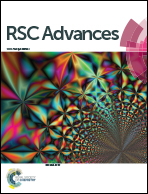Investigation into the enantiospecific behavior of trichlorfon enantiomers during microorganism degradation†
Abstract
Trichlorfon (TF) is commonly used as an antiparasitic agent in aquaculture. A chiral HPLC method for the detection of the two TF enantiomers in fish was developed using metolcarb as an internal standard. Both the enantiospecific behavior of R-(−)-TF and S-(+)-TF and the formation of the toxic metabolite dichlorvos during fish storage were investigated using the developed HPLC method. Results showed that the degradation of R-(−)-TF and S-(+)-TF during fish storage was enantiospecific at both 18 °C and 25 °C, with R-(−)-TF being preferentially degraded. However, no enantiospecific behavior of TF enantiomers was observed when fish was stored at either −18 °C or 4 °C. In addition, dichlorvos formation was detected in TF-contaminated fish at a range of storage temperatures. Furthermore, microbial activity was found to play an important role in the degradation of TF enantiomers and in the formation of dichlorvos, and contributed to the enantiospecific behavior of TF enantiomers during storage.


 Please wait while we load your content...
Please wait while we load your content...